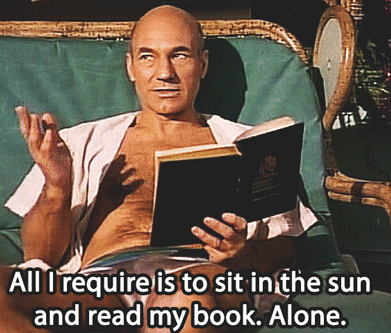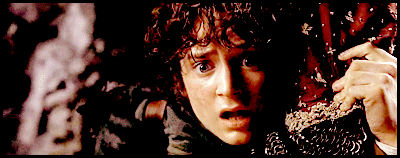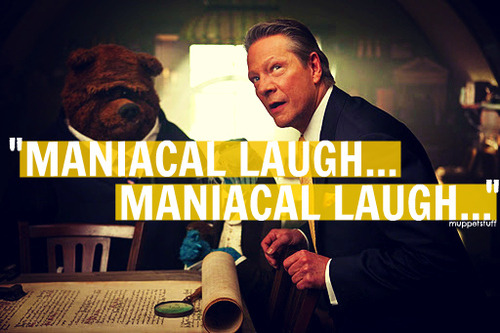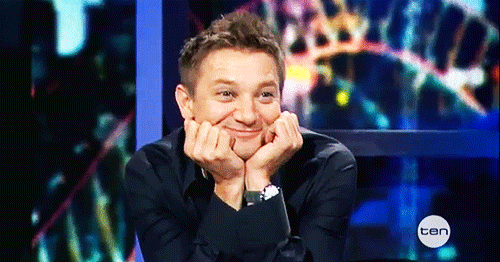A couple weeks ago, my friend Ashley tweeted this:
Friend from HS just wants me to suggest a book for her to read. A BOOK. No parameters or anything. How. What. Who.
— Ashley Herring Blake (@ashleyhblake) March 13, 2016
We got into a short discussion trying to come up with suggestions for her friend. I wondered what other books she’d liked, to try to get a feel for her taste, and she said her friend didn’t know. Her impression was that her friend thought she should read, but had no idea what she actually liked to read.
@LaurenTHCW Same. It’s like she wants to read bc she thinks she should or something. I just wanna say “It’s ok not to read. You do you.” — Ashley Herring Blake (@ashleyhblake) March 13, 2016
Now, I just want to get this out there first — I agree with this. Reading is, of course, a good skill to have, and I don’t think that never reading at all is a great idea, but the idea that everyone should enjoy recreational reading is, in my opinion, flawed. Reading for pleasure is a hobby, and just like watching movies or building model airplanes or running cross-country, it’s not for everyone.
However! I would encourage adults who have never enjoyed reading a book to give it another shot. Lots of us got our first exposure to books in school, and for many of us, the books our teachers picked out were not exactly what we would have picked for ourselves. Not everyone enjoys the classics or literary fiction (I know Teen Me sure didn’t), which is what I know made up most of my high school English curriculum. And while some of us decided to venture outside of our assigned reading lists to find books we did love, others, understandably, gave up.
Or maybe they didn’t. Maybe they kept trying, but the books they picked up didn’t resonate. Or maybe something else (poor eyesight, short attention span, dyslexia, or any number of other reasons) made the act of reading itself unappealing.

And maybe they’re fine with that. Which is okay. This post is not intended to shame anyone. Some people just don’t enjoy reading. I don’t enjoy sports or crafts, and no amount of attending football games or covering things in Mod Podge is going to change that. There is no single perfect fit for everyone when it comes to hobbies.
But according to this 2015 study by the Pew Research Center, 3 out of 10 of adults have not read a single book in the past 12 months. And while it’s very possible/likely that a good number of those are people who will never like to read, no matter what, this post is not for those people. Go, non-reading people. Live your lives. Be content and fulfilled.
But I have to believe that some of them would enjoy reading, if they could only find the right book. Just a few days ago, best-selling author James Patterson announced he was launching BookShots, aiming to publish short, catchy novels that can be read in one sitting, designed to ensnare non-readers. There is definitely a contingent of adults who would like to read, but don’t, for whatever reason. I know I see these sorts of requests pop up on Facebook all the time: I don’t read much, but would like to change that.
So if this is you — or, more likely given the readership of this blog, if this is your friend — this post is for you.
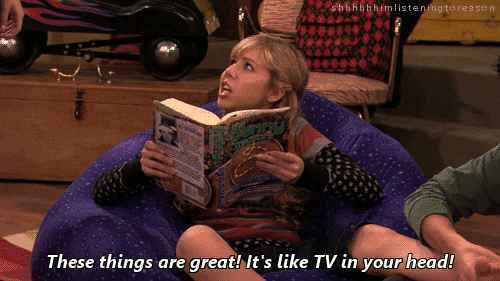
For those who have never really found a book they loved with their whole heart, but still think it could be out there, I wanted to put together a list of book suggestions. James Patterson’s bite-size books will be great for people who find the length of the typical novel daunting, but there are lots of reasons people don’t read that have nothing to do with page count. So I took to social media, asking for help, and the Bookish Internet turned out in force!
Bookish Twitter! What are your best book suggestions for reluctant ADULT readers? For ppl who don’t really read, but want to try. Any genre.
— Lauren Thoman (@LaurenTHCW) March 13, 2016
I think any book could be the book for someone, but this is a list of titles people thought would be most likely to pull in someone who’s never really understood how a book can make a person cry, or laugh out loud, or stay up all night. A list of books submitted by my social media followers isn’t very scientific, but it’s a start. Much as it might seem simple to tell someone just read about what interests you, turning your interests into a list of books can be overwhelming, even for a seasoned reader. This list may not be comprehensive, but hopefully it’ll at least give you a good jumping off point.
There are plenty of lists of books for reluctant teen readers (and those lists are GREAT), but not so many for reluctant adults. This list contains adult, YA, and even a couple MG, across all genres. I’m not separating out the YA/MG from the adult, since this entire list is already intended for adults. If I have something under the wrong heading, please let me know – I haven’t read all of these, so this categorization is my best educated guess.
I struggled with how detailed to get in this list. Some people’s suggestions came with caveats (this book is really long, but anyone with even the remotest interest in the Civil War will gobble it up) or really specific audience recommendations (this is great for people who are really into WWII stories and espionage). Ultimately, I decided to stick with just a basic genre differentiation, as writing a paragraph’s worth of description for each title would’ve made the list really hard to browse. The Amazon links provide all the extra detail you need.
Titles in red were suggested by multiple people (I could break it down further — how many suggested each — but my social media following really isn’t extensive enough for further detail to be all that meaningful).
* marks a book that is part of a series.
Fantasy
Abraham Lincoln: Vampire Hunter by Seth Grahame-Smith
*The Cainsville series by Kelley Armstrong
*The Chronicles of Narnia by C.S. Lewis
*A Darker Shade of Magic by V.E. Schwab
*The Emperor’s Edge series by Lindsay Buroker
*The Farseer series by Robin Hobb
*Game of Thrones by George R.R. Martin
The Graveyard Book by Neil Gaiman
*The Harry Potter series by J.K. Rowling
Haroun and the Sea of Stories by Salman Rushdie
The Hobbit by J.R.R. Tolkien
The Little Prince by Antoine de Saint-Exupéry
*The Mistborn trilogy by Brandon Sanderson
The Ocean at the End of the Lane by Neil Gaiman
Mr. Penumbra’s 24-Hour Book Store by Robin Sloan
The Princess Bride by William Goldman
The Scorpio Races by Maggie Stiefvater
*Six of Crows by Leigh Bardugo
*Twilight by Stephenie Meyer
Uprooted by Naomi Novik
Vicious by V.E. Schwab
Science Fiction
*Ender’s Game by Orson Scott Card
The Humans by Matt Haig
*The Hunger Games by Suzanne Collins
Illuminae by Amie Kaufman and Jay Kristoff
Jurassic Park by Michael Crichton
The Martian by Andy Weir
*Red Rising by Pierce Brown
Realistic Fiction and Romance
The Cordina’s Royal Family series by Nora Roberts
Everything, Everything by Nicola Yoon
Good in Bed by Jennifer Weiner
Hatchet by Gary Paulsen
The Husband’s Secret by Laura Moriarty
Me Before You by Jojo Moyes
The Royal We by Heather Cocks and Jessica Morgan
The Sea of Tranquility by Katja Millay
Something Like Normal by Trish Doller
A Walk to Remember by Nicholas Sparks
Where’d You Go, Bernadette by Maria Semple
Winger by Andrew Smith
Historical Fiction
All the Light We Cannot See by Anthony Doerr
*Anne of Green Gables by L.M. Montgomery
Between Shades of Gray by Ruta Sepetys
Marina by Carlos Ruiz Zafon
Middlesex by Jeffrey Eugenides
The Moon and Sixpence by W. Somerset Maugham
*Outlander by Diana Gabaldon
Out of the Easy by Ruta Sepetys
The Pillars of the Earth by Ken Follett
Rebecca by Daphne du Maurier
The Revenant by Sonia Gensler
Water for Elephants by Sara Gruen
Wish You Well by David Baldacci
Thriller/Horror/Mystery
11-22-63 by Stephen King
*The Alex Delaware series by Jonathan Kellerman
Before I Go to Sleep by S.J. Watson
Bellweather Rhapsody by Kate Racculia
Child 44 by Tom Rob Smith
Dark Places by Gillian Flynn
*The Jack Ryan series by Tom Clancy
The Girl on the Train by Paula Hawkins
Gone Girl by Gillian Flynn
*The Hunt by Andrew Fukuda
*I Hunt Killers by Barry Lyga
*Kiss the Girls by James Patterson
Misery by Stephen King
Mr. Mercedes by Stephen King
*The Myron Bolitar series by Harlan Coben
*The Pendergast series by Douglas Preston and Lincoln Child
Sharp Objects by Gillian Flynn
The Stand by Stephen King
*The Stephanie Plum series by Janet Evanovich
Warm Bodies by Isaac Marion
World War Z by Max Brooks
Non-Fiction/Memoir
1491 by Charles C. Mann
Alexander Hamilton by Ron Chernow
And the Dead Shall Rise by Steve Oney
The Color of Water by James McBride
Confederates in the Attic by Tony Horwitz
Devil in the White City by Erik Lawson
The Glass Castle by Jeannette Walls
The Hiding Place by Corrie Ten Boom
I Am Malala by Malala Yousafzai
The Order of the Death’s Head by Heinz Zollin Hohne
Stiff by Mary Roach
Unbroken by Laura Hillenbrand
Humor
Bossypants by Tina Fey
Is Everyone Hanging Out Without Me by Mindy Kaling
Why Not Me by Mindy Kaling
Yes Please by Amy Poehler
Other authors mentioned with no specific works referenced: A.J. Jacobs, Craig Johnson, Dan Brown, David McCullough, J.A. Jance, J Maarten Troost, John Elder Robison, Neil Gaiman, Rainbow Rowell, Steve Berry, Terry Pratchett, Tracie Peterson, Jennifer Weiner, Haruki Murakami, Karen Kingsbury.
When people just gave me authors without specific titles, they tended to have fairly extensive bodies of work, so take a look at their author pages and see if any write on subjects that interest you. This list includes writers of non-fiction, inspirational fiction, mysteries, fantasy, romance, and everything in between. I’d be really shocked if all of the authors listed above were your cup of tea — but I’d be equally shocked if none of them were.
A few interesting things I’ve noticed while compiling this list:
- Length seemed to have very little to do with how much reluctant adult readers liked a book. While I think a big component of kids being reluctant readers is actual reading ability, with adults (according to my very unscientific study) it seems to have far more to do with enjoyment. The overwhelming consensus seemed to be that if an adult was interested in the subject matter and the pacing was good, the actual page count was not a turn-off. (That said, not everyone is into reading doorstoppers, and that is totally okay. There are plenty of titles on this list that have lower page counts).
- The three most-recommended titles by a wide margin: The Martian by Andy Weir, Vicious by V.E. Schwab, and Devil in the White City by Erik Lawson. A sci-fi, an urban fantasy, and a historical non-fiction. Interesting genre spread.
- Most-recommended genres were thrillers and non-fiction. Thrillers I could’ve guessed — the pacing tends to be quick, without a good place to set a book down — but non-fiction was a surprise, at least to me.
- That said, there is a lot of crossover fiction above. I put each book in the category it most closely resembles, but a lot of these titles defy simple categorization. There are several books featuring time travel that read like historicals. Tons of the books outside the Thriller category have the pacing of thrillers. And so on and so forth.
- Lots of these books are what are considered “gateway” titles. Books such as Twilight and Harry Potter are widely known for sucking in people who previously wouldn’t have considered themselves readers, but there are also genre gateway books. Don’t think you like fantasy? Try A Darker Shade of Magic. Not into sci-fi? Try The Martian. Think non-fiction is boring? Maybe pick up Devil in the White City. Maybe it still won’t be your jam…or maybe that genre you didn’t think you liked is better than you think.
- I wrestled with whether to curate the suggestions I was getting according to what I consider objectionable or problematic, but ultimately I decided not to, for two reasons. 1) I’m not familiar with every author/book on this list, and I certainly don’t want to narrow the list to only books I’ve read, so even if I did curate, it wouldn’t be consistent; and 2) I don’t feel it’s my place to define what’s objectionable or problematic for someone else. What bothers me about a book or an author, you may be totally fine with. Or you may agree with me, but still want to read the book anyway for any number of reasons. So I’m including every suggestion I’ve received, even the ones that made me go hmmm. This is a list for adults, and as such, I’m trusting that anyone using it is capable of using the links provided to determine what they are comfortable reading.
- Many of these books begin a series, which tend to be great for reluctant readers, as you can stick with something you know you like for multiple books. (There are some books not marked as a series that actually do have sequels or companions, but the first book was originally written as a standalone.) I know series aren’t for everyone, though, so I’ve tried to mark them all, so you don’t accidentally wind up reading the first book of a twelve-book saga when you wanted a standalone.
As always when it comes to matters of taste, YMMV. You may see some titles here that you really struggled with, and I’m positive there are many great books I haven’t included. (If you can think of any you feel should be included, please suggest them in the comments and I’ll add them!) My best suggestion is to follow the links, read the descriptions of the books you’re considering (including the page count – some reluctant readers might devour Pillars of the Earth, while others might find its extensive page count prohibitive), and make an informed decision based on the taste, ability, and comfort level of your intended audience, whether that’s you or someone else. Keep in mind that this is a list for adults, so many of these titles (though certainly not all) will contain mature content.
And lastly, while I’ve focused on novels in this post, remember there are many other ways to read. If novels aren’t your thing, maybe try short story collections or graphic novels or comics; there’s lots of excellent storytelling going on in all formats today. Or if the physical act of reading isn’t a good option for you, try audiobooks. I know lots of people who do most of their reading via audiobooks, while driving or exercising or folding laundry (or just staring at the wall — NO SHAME if that is you). Most of the above listed titles also have an audio version, which should be available through the same link.
The bottom line is that if you want to be a reader, but just haven’t figured out how to make reading work for you yet, it’s never too late to try again.
Have you read any of these? See one you’d like to try? Know an adult reluctant reader who might be willing to give one of these books a shot? Let me know in the comments, and happy reading!


